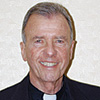AT THIS TIME every summer I can feel my anticipation rising as I look forward to another film festival to be conducted at the Immaculate Conception in Douglaston.

Arts and Culture
Fr. Robert Lauder is a philosophy professor at St. John’s University and the author of “Pope Francis’ Spirituality and Our Story” (Resurrection Press).
Building the Kingdom
Fourth in a series
I AM HAVING the strangest experience in re-reading Pope Francis’ apostolic exhortation “Gaudete et Exsultate” (“Rejoice and Be Glad”). When I first read it weeks ago, I thought it was marvelous and I quickly decided to do a series of columns about it with the hope that I could motivate readers of my columns to read the exhortation
Paths to Holiness
Third in a series
I PROBABLY COULD not even list all the reasons why I am so enthusiastic about Pope Francis’ Apostolic Exhortation Gaudete et Exultate (“Rejoice and Be Glad”). One of the reasons I think it is such an important document is that a kind of dualism has crept into the way some Catholics think about what is and what is not holy. We throw around the word “secular” so often that we can inadvertently think that there are only particular places that are sacred and certain actions that are holy. I think Pope Francis is trying to broaden our vision and deepen our appreciation of what our faith tells us about ourselves and the mystery of the Holy Spirit’s presence in our lives. If by “secular” we mean some place in which God is not present, there is no such place.
The Spirit Breathes Where It Will
When I was in grammar school and perhaps even in high school, I would have wondered if I was committing a sin just by entering a church that was not a Catholic Church.
A Deepening Union and Communion with Saints
First in a series
IN HIS APOSTOLIC exhortation “Gaudete et Exsultate” (“Rejoice and Be Glad”), after mentioning our deceased loved ones as saints, Pope Francis writes the following sentence: “The saints now in God’s presence preserve their bonds of life and communion with us.”
Persons and Promises
We begin a Eucharist by recalling the times we failed to keep our promises to God. We freely admit our sinfulness without fear because we believe God’s forgiveness is readily available.
Failing to Make Choices in Life Hinders Divine Plan
I wonder if I could find a text that would reveal more powerfully the unique importance of every person. Each of us is called by God to cooperate with God’s creative act and providential presence by contributing our own unique free choices. Every single one of us has a place in God’s plan. To refuse to freely choose when choice is called for in God’s plan is to fail to fulfill our role in God’s providence.
Co-Creating Ourselves With God in Freedom
Eighth in a series
IN ANY PHILOSOPHY course I teach at St. John’s University, I stress the importance of human freedom. I want students to understand as deeply as they can the mystery of human freedom. Perhaps more than anything else, I want them to grasp that by their choices, especially their most important choices, those that have moral and religious implications, they hold their lives in their hands. By our choices, we are co-creating ourselves with God. To the extent that our choices for ourselves are in line with the choices God has for us, we mature and grow in holiness.
Life Commitments Grant True Freedom
Seventh in a series
AMONG MY GOALS in writing this series is to dispel misunderstandings concerning personalism.
Lose Yourself to Love, Find Yourself in Christ
Sixth in a series
THERE ARE SO many insights that I have received from philosopher Father W. Norris Clarke, S.J. that it is difficult to prioritize them in importance. Father Clarke’s book “Person and Being” (Milwaukee: Marquette University Press, 1993) is a gem. There are a handful of books that have changed my life. “Person and Being” is one of them. Re-reading it again in order to write this series of columns on philosophy has really been a labor of love.
